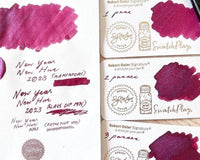Writing with fountain pens is a daily habit for most of us. We may have pens on our desks, in our bags, and sometimes even in our pockets. Having more than one pen inked is a normal occurrence for the typical fountain pen enthusiast; after all, there are so many inks to try and only so little time. However, there are some considerations regarding how long you can leave ink in a fountain pen. Fountain pens are, indeed, meant to hold ink, but at what length depends on several factors. Here, we’ll explore just that.
Think Before You Ink

Fountain pen inks come in different formulations, each with its unique characteristics. Water-based inks are most common, but there are also pigmented, permanent, and specialty inks. How long an ink can stay in a fountain pen depends on the specific properties of the ink and how it interacts with the pen components.
Factors To Consider
When keeping your pens inked for a while, there are various factors to consider.
Type Of Ink
One critical factor to consider is the type of ink being used. Water-based inks are less prone to drying out than pigmented or specialty inks. Water-based inks have a higher water content, which helps prevent them from drying in the nib and feed of the pen. However, it's important to note that even water-based inks can dry if left in a pen for an extended period.
Specialty inks, such as pigmented or permanent inks, may have different characteristics. Some of these inks contain particles that can settle and clog the pen if left unused for too long.
Pen Design
The fountain pen's design also influences how long ink can be left in it. High-quality pens often have better seals and caps that prevent excessive air exchange, reducing the chances of ink drying out. One example is the Slip & Seal technology that Platinum uses to keep its pens writing well even after you’ve left it capped for some time. Cheaper or poorly designed pens may not have effective seals, allowing air to enter and accelerate drying.
Cleaning And Maintenance
Proper cleaning and maintenance are crucial for those who plan to leave a fountain pen unused for an extended period. Flushing out the remaining ink from the pen's reservoir and cleaning the nib and feed help prevent ink residue from drying and potentially causing clogs. Cleaning the pen also removes any remnants of the old ink before refilling it.
Usage
Regular use makes fountain pen ink less likely to dry out. It also keeps the ink flowing through the nib and feed, preventing it from settling and drying. If you plan to store a pen for a short period, such as a week or two, and the pen has a good seal, water-based inks can often last without drying. We recommend using a well-behaved ink such as Pelikan 4001 Ink Bottle, Waterman, or Diamine if you think your pen might see only occasional use for a long time. However, for more extended periods of non-use, it's advisable to clean the pen before storage.
Storage Conditions
Humidity is another factor to consider. In low-humidity environments, ink may evaporate more quickly, leading to potential drying issues. Installing a humidifier can help remedy this if you live in such an environment.
How Long Can You Leave Ink In A Fountain Pen?

Pens that are used regularly can be left inked for longer periods. If you need to store them for a couple of days, it is good practice to clean the nib to prevent ink from drying up or running into the cap; you do not necessarily need to empty the reservoir.
When it comes to storing fountain pens, we do not recommend doing so with filled pens if it’s for a period of over two weeks to a month. If you need to store your pens for that length of time or beyond, then it is best to empty, clean, and dry your fountain pen thoroughly.
The Bottom Line
Leaving ink in your fountain pen is a normal part of using it, especially if you love writing with your pens regularly and inking more than one pen at a time. However, it is important to remember that leaving certain types of ink in your pen for too long can lead to complications and perhaps even damage. With good pen hygiene and proper care, you can continue to enjoy all sorts of fountain pen inks and use your favorite pens for many years to come.
By Some Folks at EndlessPens







